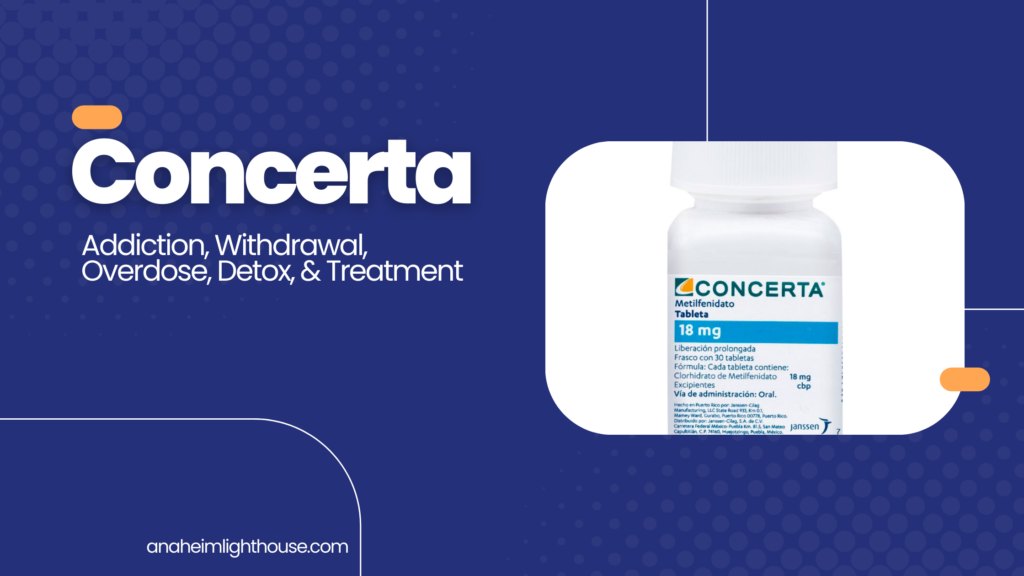Concerta: Addiction, Withdrawal, Overdose & Treatment
Concerta is a stimulant medication that is often prescribed to treat ADHD. While Concerta can be an effective medication for some people, it can also be addictive and lead to dangerous side effects like an overdose.
In this blog post, we will discuss everything you need to know about Concerta addiction, including the signs and symptoms of addiction, withdrawal symptoms, overdose risks, and treatment options.
What is Concerta?
Concerta is a brand name for the medication methylphenidate hydrochloride. Methylphenidate is a central nervous system stimulant that affects chemicals in the brain. It is a Schedule II controlled substance, which means it has a high potential for abuse and dependency.
This drug is also known by several street names. The street names vary depending on the culture of the society. Examples of street names include R-ball, skippy, Vitamin R, the smart drug, MPH, and JIF.
What Does Concerta Look Like?
Identifying this drug in stores and pharmacies is easy because it has a distinct physical appearance. Typically, this drug has no strong odor and is white in color. The different strengths of this drug also have a distinct pill identifier.
The 18mg XR capsule is yellow, oblong-shaped, with a pill imprint “alza 18”. The 27mg, 36mg, and 54 mg capsules are all oblong-shaped and have colors of gray, white, and brownish-red respectively. Meanwhile, the pill imprints of the three are alza 27, alza 36, and alza 54 respectively.
What Is Concerta Used For?
The drug is most often administered in the medical field to cure attention-deficit hyperactivity disorder (ADHD) and narcolepsy, as well as extreme daytime sleepiness.
However, this drug has been misused and abused for different reasons such as losing weight, partying, and as something to keep them awake at night during exam days.
How Does Concerta Work?
Similar to other stimulants, this drug works on the central nervous system. It speeds up brain activity by prohibiting the reabsorption of dopamine and norepinephrine in the brain. In addition, the methylphenidate portion of its chemical ingredient boosts mental focus by stimulating the cortex and brainstem.
The norepinephrine is responsible for specific actions such as emotions, sleep, concentration, and learning. When a substantial amount of this hormone is present in the blood, it contracts arteries and blood vessels to increase blood pressure.
Meanwhile, dopamine is responsible for the speed of the messaging system of the brain. It also has a great role in the reward system of the brain.
How Long Before You Can Feel the Effects of Concerta?
It can take up to 30 minutes to an hour for the effects of Concerta to kick in. However, this can vary depending on individual factors, such as body weight and metabolism.
Some people will experience the effects sooner than others, but most individuals feel the effects after an hour. If you’re taking Concerta for the first time, it’s best to give yourself enough time to feel its full effects.
How Long Does Concerta Stay In Your System?
How long Concerta stays in your system depends on several factors, including body weight, metabolism, and how often you take the drug.
In the saliva and urine, residues of this drug can still be detected for around one to three days and 48 to 96 hours respectively. In the hair follicles, it can still be detected 90 days after the last intake.
What are the Short and Long-term Effects of Concerta?
Some of its short-term effects are headache, nausea, difficulty sleeping, extreme weight loss, agitation, and lightheadedness.
Whereas, its long-term effects on the body include irregular heart rate, increased blood pressure, painful erectile function, constricted brain arteries, and damage to the optic nerves.
Consequently, abusing the drug can further lead to serious health diseases such as psychosis, schizophrenia, heart diseases, and abnormalities in one’s behavior.
Is Concerta Addictive?
Yes, Concerta is addictive. This drug is classified by the Drug Enforcement Agency as a Schedule II controlled substance where its addictive potential is similar to methamphetamine, cocaine, dextroamphetamine, and amphetamine.
A person can easily get addicted to this substance. That’s why it’s important to be careful when taking this medication.
What Are the Withdrawal Symptoms?
It’s important to note that Concerta is a stimulant medication, so stopping use abruptly can lead to a “crash” or withdrawal syndrome. This syndrome can cause unpleasant symptoms such as fatigue, headache, increased appetite, and drug cravings. These symptoms usually occur when someone stops taking Concerta after using it for a long time.
If you’re thinking about quitting Concerta, it’s important to do so gradually under the guidance of a healthcare professional. By slowly tapering off the medication, you can help minimize the risk of experiencing withdrawal symptoms.
What Causes Concerta Overdose? Signs of an Overdose
An overdose on this drug can be very dangerous and potentially life-threatening. A dose of more than 36 milligrams daily can lead to an overdose.
The common signs of an overdose are increased blood pressure, intense sweating, seizures, tremors, delusions, and muscle spasms.
What Should You Do If Someone Is Overdosing?
If someone is overdosing on Concerta, it is important to call emergency services right away.
During an overdose, the person may experience seizures and hallucinations. They may also become agitated and aggressive. Emergency services will be able to provide the person with the care they need and help them avoid further complications.
How Do You Treat Concerta Addiction? Detox & Treatment
If you are addicted to Concerta, you should seek professional addiction treatment. There are many different types of addiction treatment, and the type of treatment that is right for you will depend on your circumstances.
Detox is the first step in most addiction treatment programs. Detox involves ridding your body of the toxins that have built up as a result of drug abuse. This is followed by inpatient rehabilitation that takes place in a residential setting and provides around-the-clock care and support.
Final Thoughts: Addressing Concerta Abuse and Addiction
Concerta can be a beneficial drug for those who need it, but it’s important to be aware of the risks involved in taking this medication.
If you or someone you know is addicted to Concerta, seek expert assistance immediately. There are many resources available to those struggling with substance abuse, and getting treatment can make a world of difference.
















